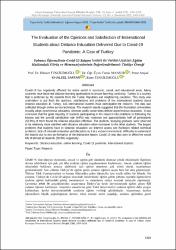The evaluation of the opinions and satisfaction of international students about distance education delivered due to covid-19 pandemic: A case of Turkey
Citation
Tengilimoğlu, D. , Mansur, F. , Khaleel Saffar, P. A. & Tengilimoğlu, E. (2021). Yabancı Öğrencilerin Covid-19 Salgını Nedeni ile Verilen Uzaktan Eğitim Hakkındaki Görüş ve Memnuniyetlerinin Değerlendirilmesi: Türkiye Örneği . Afyon Kocatepe Üniversitesi Sosyal Bilimler Dergisi , 23 (4) , 1404-1418 . DOI: 10.32709/akusosbil.986942Abstract
Covid-19, tüm dünyayı ekonomik, sosyal ve eğitim gibi alanlarda olumsuz yönde etkilemiştir. Eğitimin devam edebilmesi için pek çok ülke uzaktan eğitim uygulamalarını başlatmıştır. Ancak, uzaktan eğitim sürecinden beklenen sonucu alabilmek için eğitim ortamının çok yönlü olarak tasarlanması gerekmektedir. Son yıllarda Türkiye’de eğitim gören yabancı öğrenci sayısı hızlı bir artış göstermiştir. Türkiye Türk Cumhuriyetleri ve komşu ülkelerden gelen öğrenciler için tercih edilen bir ülkedir. Bu çalışma, Türkiye’de Covid-19 salgını sürecinde üniversitede eğitim gören yabancı uyruklu öğrencilerin uzaktan eğitim hakkındaki görüş, memnuniyet ve sorunlarını ortaya koymak amacıyla yapılmıştır. Çevrimiçi anket ile gerçekleştirilen araştırmaya Türkiye’de farklı üniversitelerde eğitim gören 435 yabancı öğrenci katılmıştır. Araştırma sonuçlarına göre Vakıf üniversiteleri senkron eğitimi daha yaygın kullanırken, devlet üniversitelerinde asenkron eğitim verildiği görülmüştür. Araştırmaya katılan öğrencilerin büyük çoğunluğunun dersleri takip etmede sorun yaşadığı, uzaktan eğitimden genel memnuniyet oranının %64 olduğu ve %53.8’inin uzaktan eğitimi etkili buldukları sonucuna varılmıştır. Lisansüstü eğitim gören öğrencilerin diğer öğrencilere göre uzaktan eğitimden daha çok memnun oldukları görülmüştür. Öğrencilerin uzaktan eğitimde yaşadıkları en büyük sorunlar ise; internet erişimi ve donanımla ilgili teknik problemler; sanal bir ortam olduğundan dolayı içsel motivasyon ve disiplin eksikliği; etkileşimli ders yapılmadığından dolayı dersleri anlamanın güç olmasıdır. Covid-19’un öğrencilerin tamamına yakınının (%90.8) sosyal hayatını da olumsuz yönde etkilediği görülmüştür. Covid-19 has negatively affected the entire world in economic, social, and educational areas. Many countries have launched distance learning applications to ensure learning continuity. Turkey is a country that is preferred by the students from the Turkic Republics and neighboring countries. This study was undertaken to put forth the opinions, satisfactions and problems of the international students about distance education in Turkey. 435 international students have participated the research. The data was collected through online survey technique. The research results suggested that the foundation universities broadly adopt synchronous education, whereas public universities deliver asynchronous education. It was concluded that the great majority of students participating in the research had problems in following the lessons and the overall satisfaction rate (64%) was moderate and approximately half of participants (53.8%) of them found the distance education effective. The students, studying graduate, were observed to be relatively more satisfied with distance education when compared to the other students. The largest problems that students have in distance education are internet access and hardware-related technical problems; lack of internal motivation and discipline as it is a virtual environment; difficulty to understand the lessons due to non-performance of the interactive lesson. Covid-19 was also seen to affect the social life of almost all students (90.8%) negatively.
Source
Afyon Kocatepe Üniversitesi Sosyal Bilimler DergisiVolume
23Issue
4Collections
- Cilt 23 : Sayı 4 [25]



















